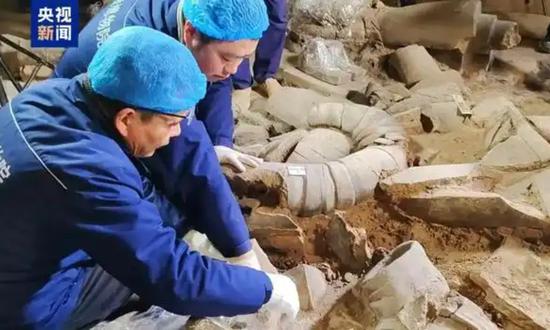Rare Terracotta Warrior resembling senior military officer unearthed at Mausoleum of the First Qin Emperor
Archaeologists have discovered a rare Terracotta Warrior figure resembling a senior military officer in the No. 2 pit nearby the tomb of Qinshihuang, the First Qin Emperor, in Northwest China's Shaanxi Province, state broadcaster CCTV reported on Monday. The find provides significant insights into the military organization and structure of the Qin Dynasty (221BC-207BC).
Zhu Sihong, head of the excavation project, noted this is the first figure of senior military officer found in the No. 2 pit since formal excavations began at the pit in 1994.
"Based on its location, we believe this figure was likely the highest-ranking military commander of this unit," Zhu said.
According to CCTV, generals are usually distinguished by their headdresses, intricate armor, and hands clasped in front of their bodies. The armor is adorned with detailed patterns, ribbons, and floral knots. Only 10 such figures have been found among the thousands of warriors unearthed to date.
The excavation at the No.2 pit also uncovered two chariot remains, three clay horses, and three other terracotta figures. Experts explained that chariots usually came with four horses and three chariot soldiers. Since formal excavation of the No.2 pit resumed in 2015, archaeologists have identified formations made up of cavalry, crossbowmen, chariots, and mixed units.
In 1974, local farmers accidentally unearthed clay fragments while digging a well, leading to one of China's most significant archaeological discoveries - the army of the Terracotta Warriors. This discovery was added to the UNESCO World Heritage List in 1987.
This year marks the 50th anniversary of the discovery of the Terracotta Warriors. Over the past five decades, archaeologists have excavated more than 2,000 life-sized terracotta warriors, along with bronze chariots, stone armor, and other artifacts, across three pits spanning over 20,000 square meters, according to CCTV.

